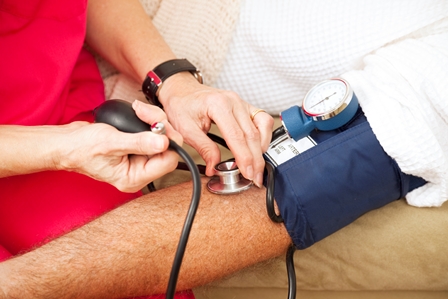 Strokes can cause long-term health problems and death. The good news is that strokes can be prevented by understanding the risk factors (which are similar to heart disease) like high blood pressure, diabetes, high cholesterol, obesity, and tobacco. To find out more about your risk for a stroke, you can talk with your physician and participate in Stroke Check this May, which is American Stroke Month.
Strokes can cause long-term health problems and death. The good news is that strokes can be prevented by understanding the risk factors (which are similar to heart disease) like high blood pressure, diabetes, high cholesterol, obesity, and tobacco. To find out more about your risk for a stroke, you can talk with your physician and participate in Stroke Check this May, which is American Stroke Month.
Stroke Check is The American Stroke Association’s Arizona-founded program to encourage physicians, hospitals, and community service groups to utilize stroke risk assessment tools to perform free stroke screenings and increase awareness of stroke. The Stroke Check Program is free and you can find a screening program.
Quick pre-hospital and hospital interventions are critical once a stroke happens. Remembering the acronym F.A.S.T can teach you the signs of stroke. F.A.S.T. stands for Face Drooping where one side of the face droops or it is numb; Arm Weakness where one arm is weak or numb; Speech Difficulty, when speech is slurred, the person is unable to speak or hard to understand; and finally Time to call 9-1-1. If someone shows any of these symptoms, even if the symptoms go away, call 9-1-1 and get the person to the hospital straight-away.
For more resources you can visit our Heart Disease and Stroke Prevention Program.










According to the Center for Disease Control, prescription drug overdoses and emergency room visits are at epidemic proportions. Drug Over Doses are the Number One Cause of Death in the United States. http://www.cdc.gov/homeandrecreationalsafety/overdose/facts.html
Marijuana has a Zero Lethal Overdose rating called an LD-50.
Marijuana competes with many of the anti-depressant, anti-psychotics and pain pills that are filling our emergency rooms and morgues. The ADHS is heavily invested in these dangerous synthetic medications.
We need to have a discussion about this conflict of interest and how much suffering and death this conflict has caused in Arizona since 1996.
For the first time in history, drug poisoning deaths have become the number one cause of accidental deaths in America.
Arizona is no exception to this problem.
•According to data from Arizona’s Prescription Drug Monitoring Program, between 2009 and 2011, there were approximately 10 million Class II-IV prescriptions written each year in Arizona. Prescription pain relievers accounting for over half of the drugs dispensed.
•In 2010, 13% of Arizona adults reported some type of prescription drug misuse in the past 30 days, with half of the misuse related to prescription pain relievers. Likewise, in 2010, 10.4% of Arizona youth reported some type of prescription drug misuse in the past 30 days, with an alarming 76.7% of the misuse involving prescription pain relievers.
•Arizona has also seen a corresponding, and dramatic, increase in opioid-related cases in Emergency Departments and drug poisoning deaths involving Rx drugs (Arizona Department of Health Services).
To address the growing concern over Rx drug misuse in Arizona and related consequences, the Arizona Substance Abuse Partnership (ASAP) has endorsed a Prescription Drug Reduction Initiative.
As a first-step toward the development of this initiative, the Governor’s Office for Children, Youth and Families and the Arizona Criminal Justice Commission hosted a Prescription Drug Expert Panel in February 2012 that involved local experts from law enforcement, the prevention field, and the medical community. Using the strategies proposed by the Office of Drug Control Policy (ONDCP) as a starting point, the experts and attendees formulated a set of data-and-research-driven strategies to be used in a multi-systemic, multi-agency collaborative approach to reduce prescription drug misuse in Arizona.
State Agencies Involved:
1. Governor’s Office for Children, Youth and Families
•Leadership and guidance on the initiative and liaison with the Arizona Substance Abuse Partnership and the Epidemiology Work Group
2. Arizona Criminal Justice COmmission
•County-level pilot coordination
•Data-driven consultation for programmatic implementation
•Process and outcome evaluation for the initiative
3. Arizona Department of Health Services
•Development and training on Best Practice Guidelines for Opioid Prescribing in the Emergency Department
•Data-sharing for the evaluation (Rx-related ED visits and deaths; neonate exposure to Rx opioids)
4. High Intensity Drug Trafficking Area
•Development and dissemination of Rx drug law enforcement training
•National distribution of the Arizona pilot project through the National Meth and Pharmaceutical Initiative
5. Arizona State Board of Pharmacy
•Training on use of the Prescription Drug Monitoring Project
•Quarterly report-cards sent to all pilot prescribers to help them self-monitor prescribing practices
•Data-sharing for the evaluation (type and number of pills prescribed; increases in PDMP sign up)
6. Attorney General’s Office
•Assisting with implementation of the youth and adult education curriculums
•Assisting with data collection for the evaluation
7. Arizona Department of Public Safety
•Data-sharing for the evaluation (Rx drugs found in DUI crime lab analyses)
Mr. Humble, as and Epidemiologist you have had to have known about the 5,000 year medical history and uses of marijuana well before 1996. How can you justify your opposition to medical marijuana and heavy investment in the generic anti-depressant, anti-psychotic and synthetic pain medications that compete with the benefits and non-toxic value of marijuana? Is there something about marijuana that you know that the electorate may not be aware of?